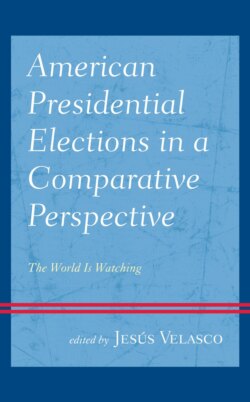Читать книгу American Presidential Elections in a Comparative Perspective - Группа авторов - Страница 33
На сайте Литреса книга снята с продажи.
China’s Responses to Trump’s Victory: No Cause for Celebration
ОглавлениеDonald Trump’s victory was both shocking and unsettling for the Chinese. While acknowledging that “neither the US nor the world” was ready for a Trump presidency, The Global Times quickly published an editorial defending the strong China-US ties and arguing that China, as “one of the quickest countries to adapt” would be capable of coping with the potential uncertainties of a Trump presidency.69 The Chinese government also quickly responded to Trump’s victory. Chinese President Xi Jinping reached out to offer his congratulations to Trump, first through a congratulatory message and later a telephone conversation, and expressed his desire to move ChinaUS relations forward from a new starting point. China’s Ministry of Foreign Affairs similarly expressed its hopes of working with the new administration to develop a steady and sound bilateral relationship.
Meanwhile, China’s pundits offered their own interpretations of Trump’s victory. Shi Yinhong points out that Trump’s election suggests that fundamental changes have taken place in US domestic politics. He cautions that while Trump’s China policy will surely have negative effects on Sino-US economic cooperation, the Chinese government will also grow more assertive in its dealings with Washington.70 Zhang Yeliang argues that it would be almost impossible for President Trump to reunite the United States, as the political landscape of American politics has been fundamentally altered.71 For Zhou Xinyu, the election of Trump suggests that the United States has adopted a new way of thinking both about itself and about its relations with the world.72
While Trump’s victory has reinforced many Chinese criticisms of the decay of American democracy, there are serious concerns in China’s policy circles about the prospect of dealing with a Trump administration. Shortly after his victorious election, President-Elect Trump fired a volley of bewildering comments on Sino-US relations and broke diplomatic protocol between China and United States for the first time in four decades by having a phone conversation with Cai Yingwen, the regional leader of Taiwan. Later he went further by publicly challenging the “One-China” policy, the bedrock of China-US relations.
Trump’s outrageous comments about China-US relations immediately generated backlash from the Chinese government as well as heated discussions among China’s general public. On December 14, 2016, the Huanqiu network conducted an online survey on Chinese perceptions of Trump as well as the future of Sino-US relations.73 Of the 8,800 Chinese participants in this survey, nearly half of them believed that President-Elect Trump’s recent actions were “jeopardizing Sino-U.S. relations and China must respond.” About three quarters of the participants expressed skepticism about Trump’s goal to ‘Make America Great Again.’” The survey also demonstrated a significant change in Chinese perceptions of Trump only one month after his election, as many respondents thought that Trump was not as friendly to China as expected, while 44 percent of the respondents confessed that they did not expect him to be friendly to China in the first place. As for the trajectory of China-US relations in the Trump era, about half of the respondents were “pessimistic” and about 13 percent of them predicted that the relationship would “completely head for the worse.” On the issue of how China should respond if Trump continues to challenge the “One-China policy,” one fifth of the respondents thought China should impose sanctions on America and break off cooperation on major international issues. Regarding Trump’s campaign pledge to “Make America Great Again,” over three quarters of the respondents flatly said, “he couldn’t [do] it.” Furthermore, about 77 percent of the respondents agreed that the American democratic system had failed to elect an honorable and presentable leader. The percentage of respondents who thought Trump would be an outstanding leader was only about 6 percent.
The findings of the survey demonstrate the Chinese people’s growing dissatisfaction and opposition to the incoming Trump administration, if not the emergence of a new anti-Trump movement in China. It also seems to suggest the early end to an “imagined honeymoon” between China’s policy circles and the Trump administration. Of course, China still has good reason to believe that the foundation of China-US relations remains structurally solid, as it is becoming increasingly adept in handling China-US relations despite the negative influence of America’s domestic politics. As one Chinese scholar argues, the prospects of China-US relations might depend more on how well China, as an important economic and strategic partner of the United States, can help realize Trump’s agenda.74
